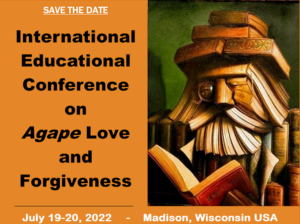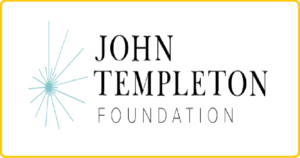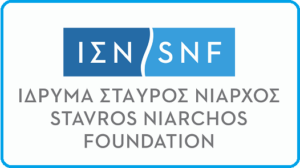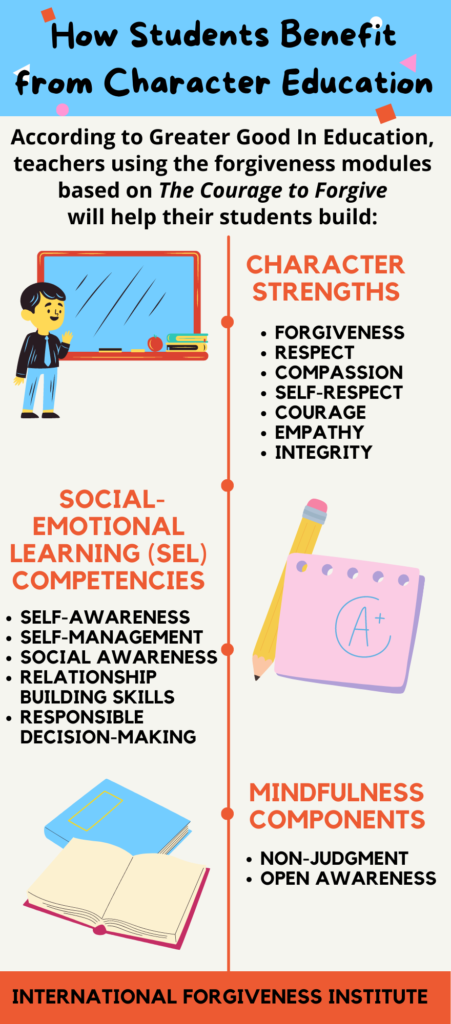Tagged: “Dr. Robert Enright”
If a person begins to forgive and then decides that he is no longer ready, is it OK to slow down or even stop the process? If I did that, I feel that it would be unfair to the person who is asking to be forgiven.
There are two issues here. The first is the offended person’s forgiveness process and the other is the feelings and needs of the one who wants to be forgiven. The first issue is basically care of the self, which we have to do. As long as the one forgiving is slowing down or stopping for a good reason, then it is fine to back off, rest, and try to gain strength before pressing on to forgive. Forgiveness is hard work. A reason that is not good is this: slowing down the process to frustrate the other person. This, of course, would be revenge, which is not even close to the process of forgiveness. So, slowing down or stopping for now can simply show the forgiver how hard it is to sustain this virtue.
The second issue concerns the needs of the one who wants forgiveness. Again, we are presuming a good reason for the forgiver’s slowing down. Under this circumstance, it is part of the offending person’s bearing the pain in waiting. There are no guarantees once a person asks for forgiveness and so part of that process is to have patience and to give the forgiver a chance to grow into a forgiving response. The waiting can be painful, but if endured for the sake of the forgiver, it can lead to forgiving, receiving the forgiveness, and reconciling.
The Good Old School Days
OK, everyone, it is time to reflect on those good old school days of yore, those care-free days when everyone thought we did not have a care in the world. Yet, sometimes we carry burdens from those days and we do so in the silence of our own hearts. When was the last time that you, as an adult, had a discussion about your days in elementary, middle, or high school? When was the last time you had such a discussion with an emphasis on the emotional wounds you received back then? I am guessing that such discussion-times have been quite rare.
I wonder how many of you reading this still have some unresolved issues from the good-old-days. It is in school, within the peer group, at recess, on the sports team that our current sense of self is shaped, at least to a degree. Sometimes we are influenced by those days to a greater extent than we realize.
So, it is time for a little quiz. Please think about your days in school and see if you can identify one person who was unjust to you, so unjust that when you think about the person now, it hurts. This person is a candidate for your forgiveness. I have an important question for you: How has this person inadvertently influenced your own view of yourself? How has this person’s actions made you feel less than who you really are? Do you see that it is time to change that?
My challenge to you today is to take steps to forgive the person for those behaviors long ago that have influenced you up to this very moment. It is time to take a better look at what happened, to forgive, and then to ask the question after you forgive: Who am I now as I admit to the injustice, admit to it negatively influencing how I have seen myself all these years, and who am I now as I stand in forgiveness?
Perhaps the good old days will seem a little brighter once you forgive. You will have lifted a silent burden.
Robert
JOIN US! International Educational Conference on Agape Love and Forgiveness
A research project focusing on agape love and forgiveness, now underway in three culturally distinct areas of the world, will culminate next summer with an international educational conference to be held in Madison, Wisconsin. The conference will be hosted by the International Forgiveness Institute (IFI)—the nonprofit organization founded in Madison 27 years ago. The research is being conducted by researchers at the University of Wisconsin-Madison.
distinct areas of the world, will culminate next summer with an international educational conference to be held in Madison, Wisconsin. The conference will be hosted by the International Forgiveness Institute (IFI)—the nonprofit organization founded in Madison 27 years ago. The research is being conducted by researchers at the University of Wisconsin-Madison.
Working with elementary school children in Northern Ireland, Israel (both Arabic- and Hebrew-speaking schools), and Taiwan, the research is being funded by the John Templeton Foundation which has been supporting research on forgiveness for more than 20 years. The Foundation’s p rimary goal is “to ignite a global conversation on forgiveness to help everyone experience its benefits and to increase the visibility and funding of forgiveness innovations.”
rimary goal is “to ignite a global conversation on forgiveness to help everyone experience its benefits and to increase the visibility and funding of forgiveness innovations.”
The 3-year project was developed by and is being conducted under the direction of Dr. Robert Enright, co-founder of the IFI and a professor of educational psychology at the University of Wisconsin-Madison. Its principal focus is on incorporating agape love fundamentals with Dr. Enright’s Forgiveness Curriculum materials for 5th grade students.
“Agape love is drawn from Greek tradition and is the highest expression of forgiveness toward those who caused pain,” Dr. Enright explains. “I call it the ultimate form of love—the kind of love that has never before been scientifically examined as part of forgiveness research.”
 The research portion of the agape love and forgiveness education project will continue through most of this school year with 60 teachers and up to 1,200 students at the experimental sites. Some of those educators will outline their experiences and present their findings during the July 19-20, 2022 International Educational Conference on Agape Love and Forgiveness at the University of Wisconsin-Madison campus.
The research portion of the agape love and forgiveness education project will continue through most of this school year with 60 teachers and up to 1,200 students at the experimental sites. Some of those educators will outline their experiences and present their findings during the July 19-20, 2022 International Educational Conference on Agape Love and Forgiveness at the University of Wisconsin-Madison campus.
A new website that was created specifically for this Templeton Foundation project was recently launched with an abundance of information about agape love, forgiveness education, and the Conference. The website will serve as an ongoing platform where educators can access curricula and other teaching resources. It will also house all Conference presentations and education materials developed through the project. Visit the website: Agape Love and Forgiveness.
- Learn what agape love is and what makes it unique: Agape Love.
- Learn about the amazing benefits of Forgiveness Education.
Forgiveness Education in Greek Schools Now Includes How to Handle Trauma and Anger
More than 3,000 grade school students in Greece are learning how to reduce their anger, increase cooperation, gain resilience, and transform their traumas into personal character strengths through Forgiveness Education classes during this 2021-2022 school year.
“Trauma Transformation Through Forgiveness Education” is a social-emotional learning (SEL) program developed by Dr. Peli Galiti, Ph.D., M.Ed., research scholar at the University of Wisconsin – Madison. Dr. Galiti, a native of Athens, is also Director of the Greek Forgiveness Education Program (GFEP) started in 2014 by the Madison-based International Forgiveness Institute (IFI).
“This one-of-a-kind program is based on the educational research studies conducted by Dr. Robert Enright who pioneered the field of Forgiveness Education,” says Dr. Galiti. “His studies have demonstrated that Forgiveness Education classes help students reduce in anger and hostile attribution, increase in empathy, and actually result in improved grades.”
Dr. Enright is a UW-Madison educational psychology professor who co-founded the International Forgiveness Institute in 1994. He has developed comprehensive Forgiveness Education curricula for students in grades K-4 through 12th that are now being used in more than 30 countries around the world.
According to Dr. Galiti, the new program is actually a collaboration between the IFI, UW-Madison, and two Greek universities—the Aristotle University of Thessaloniki and the National and Kapodistrian University of Athens (where Dr. Galiti previously lectured). Funding is provided by the Athens-based Stavros Niarchos Foundation, one of the world’s leading private, international philanthropic organizations. The program also has the endorsement of the Greek Ministry of Education.
Dr. Galiti began implementation of the Trauma Transformation program last September by leading a series of Forgiveness Education workshops for 110 Greek teachers. Those teachers are delivering the forgiveness classes this semester at schools in four Greek cities–Athens, Larisa, Patra, and Thessaloniki.
That training focused on techniques and methods the teachers could use to help their students manage traumatic experiences and any personal or relational difficulties that might cause harm and pain. Thematic instructional units included:
- Forgiveness Education theory and principles.
- Why forgiveness is necessary and how it is applied in the school environment.
- Theories about trauma and its treatment.
- Transformation and wound healing through Forgiveness Education.
- Collaboration in the classroom and conflict resolution.
- The experience of Forgiveness Education in Greek schools: Best Practices and Case Studies.

These grade school teachers in Athens were among the 110 teachers who received Forgiveness Education training conducted by Dr. Peli Galiti as part of the collaborative effort between the University of Wisconsin-Madison and the University of Thessaloniki.
The collaborative training efforts for this Forgiveness Education program have received support and major funding through the Greek Diaspora Fellowship Program that is designed to help avert Greece’s brain drain and develop long-term, mutually beneficial collaborations between universities in Greece, the United States, Canada, South Africa and Australia. The Fellowship Program is managed by the Institute of International Education in collaboration with the Fulbright Foundation in Greece, and funded by the Stavros Niarchos Foundation.
In 2017, Dr. Galiti was one of 30 Greek- and Cypriot-born scholars representing 28 prominent United States and Canadian universities who traveled to Greece to conduct academic projects with their peers at Greek universities as part of the Greek Diaspora Fellowship Program. As part of her fellowship, Dr. Galiti hosted workshops about Restorative Justice and Forgiveness Education, along with conducting research about bullying prevention and class collaboration.
- Visit the Greek Forgiveness Education Program website.
- Watch a 4 min. 12 sec. video about the Greek program: Learning to Forgive.
- Read more about Dr. Galiti’s eductional work in Greece.
- Watch a video webinar on Greek Forgiveness Education featuring presentations by Dr. Galiti and Dr. Enright.
About the Stavros Niarchos Foundation:
The Stavros Niarchos Foundation (SNF) (www.SNF.org), is one of the world’s leading private, international philanthropic organizations, making grants in the areas of arts and culture, education, health and sports, and social welfare. Since 1996, SNF has committed more than $3.3 billion through 5,100 grants to nonprofit organizations in 135 countries around the world.
The Foundation funds organizations and projects that are expected to achieve a broad, lasting and positive impact for society at large, and exhibit  strong leadership and sound management. The Foundation also supports projects that facilitate the formation of public-private partnerships as an effective means for serving public welfare. In addition to its standard grants, the SNF has continued to respond to the urgent needs of Greek society, by providing relief against the severe effects of the socioeconomic crisis through three major grant initiatives of $378 million.
strong leadership and sound management. The Foundation also supports projects that facilitate the formation of public-private partnerships as an effective means for serving public welfare. In addition to its standard grants, the SNF has continued to respond to the urgent needs of Greek society, by providing relief against the severe effects of the socioeconomic crisis through three major grant initiatives of $378 million.
Greater Good in Education Promotes Forgiveness/Character Education
An internationally-acclaimed organization that provides research-based tools for professional educators is touting the most recent International Forgiveness Institute (IFI) curriculum guide by creating an entire “best practices” forgiveness component for educators on its website.
Forgiveness for Elementary School is a collection of four practices that provide students with tools to help them understand and begin a journey toward forgiveness. Published on the Greater Good in Education (GGIE) website, the module is dedicated to helping teachers implement learning techniques that focus on forgiveness, mindfulness, and character education.
Those techniques are presented in the new IFI Curriculum Guide The Courage to Forgive: Educating Elementary School Children About Forgiveness. The guide was written by Dr. Suzanne Freedman, forgiveness researcher and Professor of Educational Psychology at the University of Northern Iowa, and Dr. Robert Enright, IFI founder and Professor of Educational Psychology at the University of Wisconsin-Madison.
The Courage to Forgive is a social-emotional learning (SEL)/character education teaching guide that features 16 lessons, each approximately 45 minutes in length. It includes a comprehensive 15-page introduction that explains what forgiveness is (and is not) as well as why forgiveness is such a crucial subject for grade school students. The guide becomes the 15th volume in the IFI’s library of curriculum guides (for students in pre-kindergarten through high school) and the 19th educational training program offered by the IFI.
“Although the new curriculum was written specifically with 4th and 5th grade students in mind, it can be used with younger students as well as those in middle school,” according to Dr. Freedman. “We designed it so that the instructional activities can be modified as necessary for different age groups–even adults.”
The GGIE website component includes these four modules which are based on The Courage to Forgive curriculum:
1. Creating Space for Forgiveness by Letting Go of Anger
In this module, students discuss the negative consequences that anger can have, identify the benefits of letting go of anger after expressing it, and brainstorm ideas for how to cope with anger.
2. Introduction to Forgiveness
Students develop a working definition for what forgiveness is and what it is not, and consider its relationship to justice, revenge, the role of apology, and reconciliation.
3. Understanding Inherent Worth: A Path towards Forgiveness
As a class, students read the book Let’s Talk About Race by Julius Lester to begin a discussion on inherent worth, then think critically about how inherent worth and forgiveness are related. Links to a virtual reading of the book are included.
4. Learning from Courageous Forgivers
Students read The Story of Ruby Bridges by Robert Coles and reflect on the value of being a forgiving person, as exemplified by the story. Again, links to a virtual reading are provided.
“Forgiveness education focuses on recognizing and validating students’ anger, as well as teaching students to express emotions in a healthy way, understand the perspective and humanity of others, and practice empathy and compassion toward others,” Dr. Freedman added. “It is almost impossible to go through life without experiencing hurt, and knowing how to forgive gives students the opportunity to choose love and kindness over anger and hatred.”
Greater Good in Education is produced by the University of California-Berkeley’s award-winning Greater Good Science Center (GGSC). The Greater Good Education Program presents education professionals with practical, scientific insights that help them better understand the roots ![]() of kind, helpful–or “prosocial”–behavior and emotional well-being, and how they can build those skills in themselves, their colleagues, and their students.
of kind, helpful–or “prosocial”–behavior and emotional well-being, and how they can build those skills in themselves, their colleagues, and their students.
The 65-page The Courage to Forgive curriculum guide is available in downloadable electronic format on the IFI website for $30. GGIE readers are able to purchase the electronic version at a discounted price of just $15.






